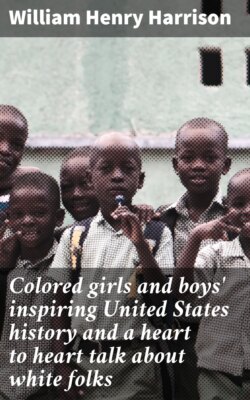Читать книгу Colored girls and boys' inspiring United States history and a heart to heart talk about white folks - William Henry Harrison - Страница 15
На сайте Литреса книга снята с продажи.
FOLK-LORE SONGS OF THE AMERICAN NEGRO
Different Emotions
ОглавлениеTable of Contents
Prayer
From lips of slaves with age bent low,
Wet prayers burst forth in deepest flow
To God above that some new light
Would slaves unborn save from such plight.
Work
Down they went the great long rows
Swinging scythes and chopping hoes
In time with cheerful labor songs
To ease the work and sting of thongs.
Song
“Camp Meetin” times were when their songs
Rang loose full pathos of slave wrongs,
And pent-up hearts with anguish fills
Were drained as springs on sloping hills.
Play
When work was done and nights were theirs,
They oft did have most jolly fairs
Quilting rags or shucking corn
With laughter, dance and fiddles worn.
—Harrison.
“THE only American music”. This is the terse, sincere and high comment made quite a number of years ago by Edward Everett Hale, author of “A Man Without a Country”, in relation to the rightful recognition and value of the American Negro melodies sung on the Southern plantations during slavery. Since then, well-read, well-bred and music loving people of both races have come to fully recognize, acknowledge and appreciate the truthfulness of the above compliment.
For many years after their freedom great number of ex-slaves harbored bitter dislikes toward these songs because they so clearly and painfully reminded them of their past ill-treatment and sufferings during slave days. Most of their children caught this feeling direct from their parents or indirectly through their own vivid imaginations formed from what they had heard about slavery. But quick and deep understanding people of both races soon found in these crude tuneful words something far more interesting and touching than mere memories of slavery sins and sufferings—they saw and felt in such weird and original chants the most beautiful and truest life pictures of the true soul that it is possible for human being to paint with colorful and verbal expressions of tear moistened sorrows and smile dried joys. Thus music lovers and masters began at once to value this music as among the most precious finds to be added to their treasuries of folk-lore songs.
World recognized Negro music transposers and composers are today taking these rough, crude and half-savage chants and, without destroying their originalities of construction or pureness of quality, lifting them from the lowest depths of ignorant fun-making burlesquers to the highest level of intelligent and serious-minded music admirers. And throughout the musical world today celebrated chorus leaders, conductors, etc., of both races in giving even operatic recitals indicate by their programs rendered that they consider no first-class recital complete unless one or more of its numbers are expressions of Negro folk-lore music as Burleigh, Dett, Diton, Work and others have so classically elevated them. These broad-minded and just manifestations are gradually causing the general public to become more interested in, give more serious thought to, and show more appreciation of the true dignity and value of these melodies. They are also rapidly educating the American Colored people as a mass not to hate and cast aside but to love and preserve this music as a race pride heritage so costly purchased and handed down by their fore-parents and as one of the most valuable and rare features of American history.
Among the foremost composers, singers and lecturers in the Negro race who are giving tremendous aid and are largely responsible for the development of the above favorable sentiments are Cleveland G. Allen, New York, N. Y., Harry Burleigh, New York, N. Y., R. Nathaniel Dett, Hampton, Va., Carl Ditson, Phila., Pa., E. Azalia Hackley, Detroit, Mich., Kathleen P. Howard, Birmingham, Ala., J. Wesley Jones, Chicago, Ill., Jennie C. Lee, Tuskegee, Ala., Nellie M. Mundy, New York, N. Y., Jas. A. Mundy, Chicago, Ill., F. J. and J. W. Work.
